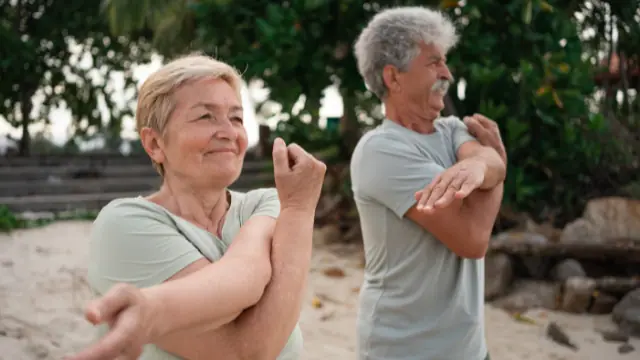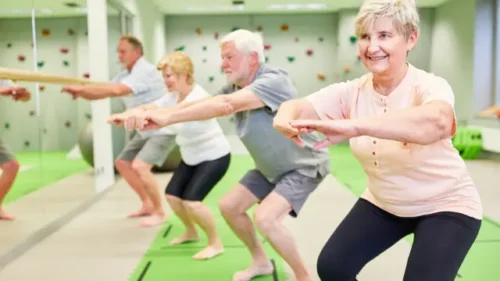
Stay Strong, Stay Active: Health and Fitness Tips for Older Adults
As we get older, it’s essential to prioritize our health and well-being, and one key aspect of that is maintaining a regular fitness routine. Staying active not only improves physical strength and mobility, but also boosts mental wellbeing and overall quality of life. In this post, we’ll explore a variety of fitness tips tailored to older adults specifically. So, let’s find out more about how you can stay strong and active well into your golden years!
Start with a Gentle Warm-Up
Before you engage in any physical activity, it’s essential to warm your muscles up and prepare your body for exercise. Begin with a gentle warm-up routine that includes light stretching, walking, or cycling. This will increase blood flow, loosen up your joints, and reduce the risk of injury.
Focus on Cardiovascular Exercises
Cardiovascular exercises or aerobic exercises are fantastic for improving your heart health, lung capacity, and overall endurance, which is why they’re often a key part of fitness programs for seniors. Take part in activities like brisk walking, cycling, swimming, or low-impact aerobics.
Strength Training for Strong Bones and Muscles
Strength training plays an essential role in maintaining muscle mass and bone density, both of which tend to decline with age. Incorporate weight-bearing exercises into your routine, such as lifting weights, using resistance bands, or doing bodyweight exercises like lunges, squats, and push-ups. Start with lighter weights and gradually increase the intensity as you build strength.
Flexibility and Balance Exercises
Improving flexibility and balance is key for preventing falls and maintaining mobility. Consider practicing activities like tai chi or yoga, which enhance flexibility, balance, and overall body awareness. These exercises also promote relaxation and help reduce stress levels.
Tailor Workouts to Your Abilities
It’s important to listen to your body and choose exercises that suit your abilities and fitness level. Modify the duration of workouts based on your comfort and energy levels. If you have any existing health conditions or concerns, consult with your healthcare provider before starting a new exercise program.

Stay Hydrated
Proper hydration is key for overall health, particularly during exercise. Drink plenty of water before, during, and after your workouts to stay hydrated and maintain optimal bodily functions. Dehydration can lead to fatigue, dizziness, and muscle cramps, so it’s crucial to prioritize fluid intake.
Pay Attention to Joint Health
As we get older, our joints may become more susceptible to discomfort and stiffness. To promote joint health, consider low-impact exercises that minimize stress on the joints, such as swimming or using an elliptical machine. If you experience persistent joint pain or discomfort, it’s important to consult with a healthcare professional for proper diagnosis and guidance.
Incorporate Functional Fitness
Functional fitness exercises focus on improving your ability to perform daily activities efficiently and independently. Examples include step-ups, squats, and carrying groceries. By incorporating functional exercises into your routine, you can enhance your strength, flexibility, and balance for everyday tasks.
Find Activities You Enjoy
Staying strong and active shouldn’t feel like a chore. It’s worth spending some time to discover activities that you genuinely enjoy and incorporate them into your fitness routine. Whether it’s dancing, gardening, golfing, or joining a local hiking group, finding activities that bring you joy will keep you motivated and make exercise more enjoyable.
Stay Social and Accountable
Maintaining an active lifestyle is easier when you have a support system. Consider joining fitness classes or clubs tailored to older adults, where you can meet like-minded individuals and engage in group activities. Having social connections can boost motivation and make exercising more fun. You might want to find an exercise buddy who shares your fitness goals and interests. Exercising together not only provides companionship but is also a great way to keep you accountable and motivated to stick to your routine.
Listen to Your Body
While challenging yourself and pushing your limits is important, it’s just as crucial to listen to your body’s signals. If you experience any pain, dizziness, or extreme fatigue during exercise, it’s vital to take a break and rest. Pushing through discomfort may lead to injuries or setbacks, so always respect your body’s limits and give yourself time to recover when needed.

Prioritize Rest and Recovery
Rest and recovery are just as important as physical activity itself. Allow your body time to recover between workouts to prevent overuse injuries and fatigue. Incorporate rest days into your weekly routine and consider activities like gentle stretching or relaxation techniques to promote muscle recovery and reduce stress.
Maintain a Healthy Diet
Physical activity and a healthy diet go hand in hand. Choose a balanced eating plan that includes a variety of fruits, vegetables, lean proteins, whole grains, and healthy fats. Aim for appropriate portion sizes, or track calories and macros if you prefer to be precise. A nutritious diet provides the fuel your body needs for optimal performance and recovery.
Get Regular Check-ups
Regular health check-ups are essential for monitoring your overall wellbeing and identifying any potential health concerns. Consult with your healthcare provider to ensure you are in good physical condition for exercise. They can also provide guidance on exercises or modifications that are suitable for your specific health needs.
Stay Consistent
Consistency is key when it comes to maintaining an active lifestyle. Make exercise a regular part of your routine and stick to it. Set realistic goals and gradually increase the intensity or duration of your workouts as you progress. Remember, even small steps forwards are better than remaining sedentary.
Beyond Exercise: How to Improve Your Overall Health and Wellbeing
Along with regular exercise and good nutrition, maintaining overall health and wellbeing is crucial for strong, active and healthy aging. General health encompasses various aspects, including sleep and mental wellbeing. By prioritizing the following areas, you can enhance your quality of life and make the most of your senior years.

Prioritizing Sleep for Overall Wellbeing
Adequate sleep is crucial for your physical and mental health. As you get older, your sleep patterns may change, and you may find it harder to get a restful night’s sleep. However, it’s crucial to prioritize sleep and establish healthy sleep habits. Aim for seven to eight hours of sleep each night and come up with a bedtime routine that helps you relax and wind down.
Mental Wellbeing: Nurturing a Positive Mindset
Mental wellbeing plays a significant role in overall health staying strong and active aging. Nurturing a positive mindset and managing stress levels are crucial. Take part in activities that bring you joy and purpose, such as hobbies, or spending time with family. Practice mindfulness or meditation to reduce stress and promote mental clarity. Pursue lifelong learning or explore creative outlets to keep your mind active and stimulated. If you are experiencing persistent feelings of sadness, anxiety, or stress, seek support from a mental health professional.
Maintaining Social Connections and Engagement
Social connections go much further than finding like-minded people to keep fit with; they are essential for your mental and emotional wellbeing. Stay connected with friends, family, and your community. Engage in social activities, join clubs or organizations, or volunteer for causes that are meaningful to you. Maintaining social connections can reduce feelings of loneliness, enhance cognitive function, and provide a support system. Attend local events, participate in group exercises, or even use technology to connect with loved ones if distance is a barrier.
Read More: Healthy Living for Seniors – Six Essential Tips
Embracing Lifelong Learning and Intellectual Stimulation
Lifelong learning and stimulating yourself intellectually is a powerful way to support your overall health and wellbeing as a senior staying strong. Engaging in activities that challenge your mind can help enhance cognitive function, memory, and creativity. Here are some ways to incorporate intellectual stimulation into your daily life:

- Continuing education: Take advantage of educational opportunities in your community, such as classes at local colleges or community centers. Explore subjects that interest you, whether that’s art, history, math, science, or literature.
- Reading: Immerse yourself in books, magazines, newspapers, or online blogs and articles. Reading stimulates the mind, enhances vocabulary, and opens up new worlds of knowledge and imagination.
- Puzzles and brain games: Engage in puzzles, crosswords, Sudoku, or other brain games to keep your mind sharp and improve cognitive abilities.
- Learning a new skill: Challenge yourself to learn a new skill or hobby, such as painting, playing a musical instrument, gardening, or cooking. The process of acquiring new knowledge and skills stimulates the brain and fosters a sense of accomplishment.
- Social discussions and debates: Engage in conversations with others on various topics, sharing opinions, and engaging in friendly debates. This stimulates critical thinking, expands perspectives, and promotes social interaction.
- Technology exploration: Embrace technology and its potential for learning. Use the internet to explore new subjects, take online courses, or connect with virtual communities or like-minded individuals.
When it comes to staying strong and active as a senior, it’s crucial to consider all aspects of your health and wellbeing. Along with prioritizing fitness and nutrition, consider your sleep habits, mental wellbeing, social connections, and intellectual stimulation. With a holistic approach to your health and wellbeing, you can enjoy an active, fulfilling life as you age.

